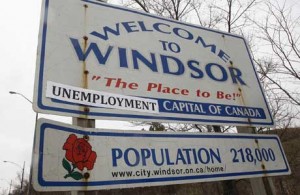 In Canada, Windsor Ontario has been one of the cities hardest hit by the economic downturn, and despite earnest efforts by creative and forward thinking residents, times are still tough.
In Canada, Windsor Ontario has been one of the cities hardest hit by the economic downturn, and despite earnest efforts by creative and forward thinking residents, times are still tough.
The city has been making news this week because the hard pressed Catholic School Board is pretty much gutting its school libraries.
Here’s Windsor-Essex District Catholic School Board director of education Paul Picard’s brainstorm:
His “lightning moment,” he said, came when he was sipping a tea at a Starbucks and observed a student next to him working a laptop, an iPod and her cellphone as she completed an assignment. “She said, ‘This is how I learn,’” said Picard, who concluded the board must move to where its students are. The new library — the board calls it a learning commons area — won’t be hush-hush quiet, he said. “It’s a much more boisterous hub, much like you would see at a student centre at the university,” with wireless connections and a teacher (a library technician isn’t a teacher, so can’t fulfil that role, he said) helping them with research and digital literacy. “That’s their world, that’s where we have to meet them,” Picard said.
Meanwhile, elementary school libraries will become “flex rooms” with computers, he suggested, while the board tries to put 1,000 books in each classroom to foster literacy. Responding to studies that link school libraries to improved student literacy, he said you can find studies that validate anything, and there is “extensive” research that backs putting more books in classrooms.[source]
That sounds nice. More education policy should be based on this “Hey, it works for Starbucks” method. Perhaps, the school board could also charge for books and play corporate tie-in music over the PA.
But seriously, Picard’s vision looks like an effort to glamourize something more dire. A recent Globe and Mail editorial points this out:
At two high schools overseen by the Windsor-Essex Catholic District School Board, a grand total of three books was checked out last month. That depressing fact is cited by Paul Picard, the board’s director of education, as one reason for a radical change now under way, changing libraries from book-centred and quiet places to noisy digital hubs…
The main reason, though, is that the board faces a loss of 800 to 1,000 students in September, and a budget shortfall of about $10-million. Cutting most of its “learning commons specialists” (technologists, not teacher-librarians) will save $2½-million a year. In their stead, visiting literacy specialists will provide much more useful advice, Mr. Picard says.[source]
Hard times, indeed. In response, Windsor area high-school students have protested and the Catholic School Board is trying(poorly) to calm things down. The furor may die down, but this could be a budding trend. This is worrisome.
This policy is a little ham-fisted with regard to Ontario education policy which has long supported libraries. The Ontario School Library Association has publicly pointed to research that argues against Picard’s outlook. But the Catholic School Board in Windsor has already shown itself unready to consult widely on such a dramatic move in policy. It’s also shameful that the school board chose to try to coat these cuts in a thin veneer of coffee-house-learning-commons-ism.
Librarians and library techs are already laid off. Elementary schools libraries have been closed and the books distributed to classrooms. Hopefully, it can be turned around. Though right now, it looks like another strike for a town struggling against a “Worst Town in Canada” rap.


